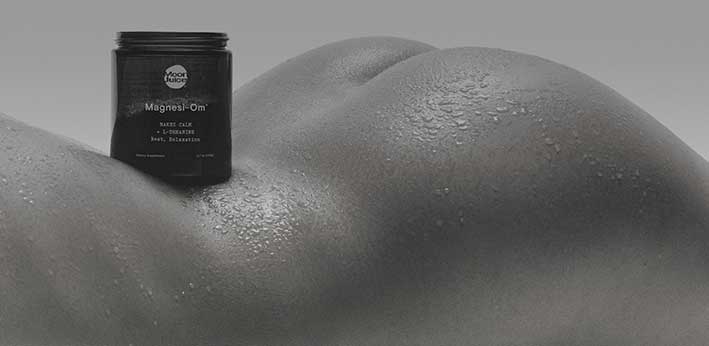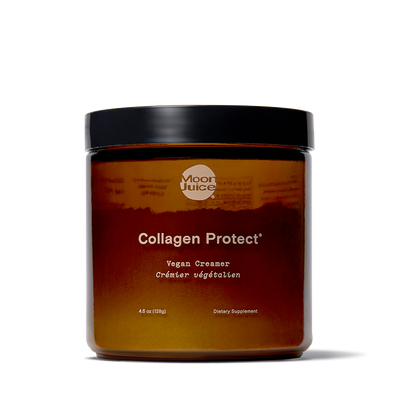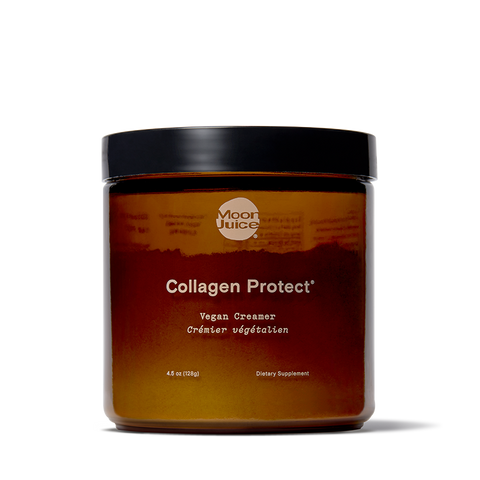Collagen is the protein that provides tensile strength and structure throughout our bodies, keeping features bouncy and tissues hardy and elastic. You might know collagen as the “beauty supplement” for skin and hair, and while these aspects are a legitimate reflection of inner health, collagen benefits for women go far beyond beauty.
We all need and produce this structural protein naturally in our bodies. From the Greek kolla, or “glue,” collagen is often referred to as the glue that holds our bodies together. The most abundant protein in our systems, it helps make up the framework of cells and tissues, and performs many vital functions for our health.
However, our internal collagen production slows down with stress and time, and a decrease in collagen protein can manifest as joint pain, wrinkles and decreased skin elasticity, and low energy levels. Luckily, supplementation can help support women’s natural supply of collagen. Discover how as we explore collagen benefits for women.
Why women need collagen
Collagen makes up about 30% of the human body’s protein and 70% of the skin’s protein, so it’s safe to say that everyone needs collagen. Menopause in particular causes a rapid dip in women’s supply of the protein.
Studies show that women lose 30% of the collagen in their skin within the first five years of menopause, occurring on average around age 52.
Women’s hormones can also change dramatically over time, especially as the result of life changes like pregnancy, birth, postpartum, and menopause. As your main reproductive hormone, estrogen, specifically, is a key player when it comes to women’s health. In addition to regulating the menstrual cycle, estrogen also has an effect on your reproductive tract, urinary tract, breasts, pelvic muscles, heart and blood vessels, bones, mucous membranes, sleep cycles, and mood.
Estrogen production starts to decline over time, particularly post-menopause. This decrease in estrogen levels has a profound impact on women’s bodies as they mature, and some studies suggest that it may be directly related to the decrease in collagen production.
In that case, women may need to be proactive about boosting their collagen through supplementation in order to help counter this loss of estrogen.
Benefits of collagen for women
Collagen is busy in our bodies: it literally holds us together. The protein is an essential component of skin health, and it also helps provide structure for our bones, cartilage, muscles, and even the lining of our gut. With that, there are various collagen benefits for women that help different aspects of our health.
Skin benefits of collagen
Collagen is one of the main structural proteins that helps keep our skin bouncy and plump. As the composition in our skin changes and we start to lose collagen, our skin starts to become thinner, looser, and less elastic. Jowls might develop. Wrinkles and lines that used to appear with facial expressions start to set in permanently.
Wondering how to stimulate collagen production in skin? A collagen-boosting supplement that provides Hyaluronic Acid, a cofactor for collagen, along with deeply hydrating Silver Ear Mushroom can help. Collagen Protect® is a vegan collagen creamer and skin supplement formulated with plant-based ingredients to help preserve your natural collagen, hydrate skin, improve skin elasticity, and minimize the appearance of fine lines and wrinkles.
Benefits of collagen for hair and nails
Besides its benefit for skin health, collagen can also be helpful for hair growth and nail health. Because collagen can help support the structural integrity of your nails, taking a collagen supplement may help increase nail strength and prevent brittleness. Additionally, due to the fact that it can provide support for the skin on your scalp and other cells in your body, it may help your hair and nails grow longer too.
Joint and bone support
Women are at a higher risk of developing osteoporosis because of the hormonal changes that occur during menopause, when those estrogen levels rapidly fall. Collagen is also an essential nutrient for bone health, helping keep bones strong and structurally sound. As estrogen and collagen productions decrease over time, our bone mass deteriorates and bones become weaker and more porous. This makes it likelier that a fall or other injury will result in a fracture.
All bones are made up primarily of collagen, so collagen supplementation can help support healthy bones. Because weak bones can also be related to low blood mineral density, maturing women can support their bones using targeted support from both collagen and mineral supplements like Calcium.
Collagen can also benefit joint health as it helps maintain the structure of your cartilage, the rubbery tissue that cushions your joints. As your collagen levels decrease with age, your risk for osteoarthritis, a degenerative joint disorder, increases.
There’s some evidence to suggest that collagen supplements could help soothe your joints. One review found that individuals with osteoarthritis had overall improvements in joint stiffness when they took collagen. However, more research needs to be done to assess whether collagen supplements could be recommended as a treatment for joint pain.
Muscle mass
Collagen is essential for muscle health. In fact, 1-10% of our muscle content is made up of this protein. It helps keep muscles strong and lends support to tendons and ligaments.
Over time, it can become harder for our bodies to build muscle, and in fact, we may start to lose muscle mass as these organs begin to weaken and atrophy. If we aren’t producing enough collagen, this signals to our bodies to prioritize our vital organs instead.
Glycine is one of the amino acids present in collagen, and it’s responsible for building muscle tissue and improving its mass. Some studies also indicate that collagen supplementation has the potential to increase other muscle proteins, including creatine, which helps give your muscles energy to work for you whether you’re exercising or lifting something heavy.
Heart health
Because collagen is integral to the health of your blood vessels, helping to keep them strong, it’s a great nutrient for supporting heart health. Collagen can also help reduce occasional inflammation throughout the body, which can be key in helping to promote a healthy heart.
Gut health
Taking a collagen supplement can help provide extra strength to the integrity of your digestive system. Some studies suggest that collagen could be helpful in bolstering digestive and gut health.
The reason has to do with the tissues of our intestinal wall and stomach. Leaky gut syndrome, in particular, happens when your intestinal lining starts to collapse, causing the toxins and nutrients that your body is processing to leak out instead.
Collagen makes up about 90% of our connective tissues. Containing a large volume of amino acids that support connective tissue health, like glycine, glutamine, and proline, collagen helps to reinforce the soft tissues in your intestinal lining and stomach.
Sign Up, Nerd Out
Get wellness tips, education, and recipes
delivered straight to your inbox.
Get wellness tips, education,
and recipes delivered
straight to your inbox.
Ways to include more collagen in your diet
Bone broth and collagen peptide supplements are the traditional ways to up your collagen intake. Because collagen is a protein only found in animals, most collagen supplements you’ll find in the vitamin aisle are made from animal products like the bones, ligaments, and scales of fish and livestock. But those who follow a vegan, vegetarian, or plant-based diet or simply want to avoid bovine collagen or marine collagen have options too.
Taking collagen supplements
Traditional collagen supplements try to build back what’s been lost with animal and marine peptides, but they don’t protect your innate supply.
A vegan collagen powder supplement can provide the amino acids and nutrients to support your own internal collagen production.
You can even find a supplement with any type of collagen you need more of for your body.
Collagen Protect® is formulated with three plant-based ingredients to help protect and preserve your natural collagen.* High molecular weight Hyaluronic Acid is clinically shown to support collagen synthesis and reduce the appearance of fine lines.* Silver Ear Mushroom supports your skin barrier and promotes deep skin hydration.* Tocos contains essential fatty and amino acids to help protect collagen and prevent visible signs of aging.* Interested in adding a powder supplement to your diet? Learn how to use a collagen powder with Moon Juice!
Eating foods high in antioxidants
In addition to collagen peptide supplementation, you can support your natural collagen production by eating collagen rich foods or foods that are high in antioxidants, especially Vitamin C. Like Hyaluronic Acid, Vitamin C is a cofactor for the production of collagen, and without it, your body can’t make more.
Make lifestyle changes to preserve your collagen
It’s also essential to preserve our remaining collagen by avoiding environmental stressors like UV damage, as well as lifestyle habits that toughen our collagen. Excessive sugar consumption can harden and fragment our collagen, while tobacco use negatively impacts collagen by decreasing the supply of oxygen to our tissues.
Additionally, chronic inflammation is an enemy to your tissues, including the connective tissues that collagen supports. To mitigate a loss of collagen over time, it’s good to avoid inflammatory diets high in simple, refined carbohydrates, fried foods, and processed meats. Chronic stress is also known to be inflammatory, and increases the hormone cortisol, which research indicates can further stall your collagen production.
As always, eating a whole-food diet rich in plants, limiting stress, and supplementing where needed are habits foundational to collagen resilience and long-term health.
Takeaways
There are many benefits of collagen for men and women that make it an essential protein for the human body. However, collagen naturally breaks down over time, and stress, smoking, sugar, and sun damage can also speed up the process. As we start to lose collagen, or experience life events that threaten estrogen levels, we might notice changes like lines setting in on our faces, bones becoming more brittle, or joint pain and other health issues. With changes in hormone levels come losses to overall tissue density and the health of our organs.
Taking a collagen supplement can help women be preventative in addressing these changes. Because collagen is one of the most abundant proteins in the body, making up a significant part of your bones, skin, connective tissues, and other organs, maintaining your collagen supply is essential to building health for longevity.
While you can take collagen peptides from animal byproducts, not everyone wants to use collagen that’s derived from livestock and fish. Those supplements try to build back what’s lost, but they may not protect what you still have. A vegan supplement can provide cofactors and amino acids to give your system the building blocks it needs to preserve and create more of your own collagen, the best kind.
Sources
- https://www.hopkinsmedicine.org/health/conditions-and-diseases/estrogens-effects-on-the-female-body#:~:text=In%20addition%20to%20regulating%20the,pelvic%20muscles%2C%20and%20the%20brain.
- https://pubmed.ncbi.nlm.nih.gov/28786550/
- https://pubmed.ncbi.nlm.nih.gov/30368550/
- https://www.ncbi.nlm.nih.gov/pmc/articles/PMC3583892/
- https://www.aad.org/public/everyday-care/skin-care-secrets/anti-aging/skin-care-during-menopause#:~:text=In%20menopause%2C%20skin%20quickly%20loses,for%20the%20next%2020%20years
- https://academic.oup.com/endo/article/158/4/1005/2913382
- https://www.ncbi.nlm.nih.gov/pmc/articles/PMC9198822/














